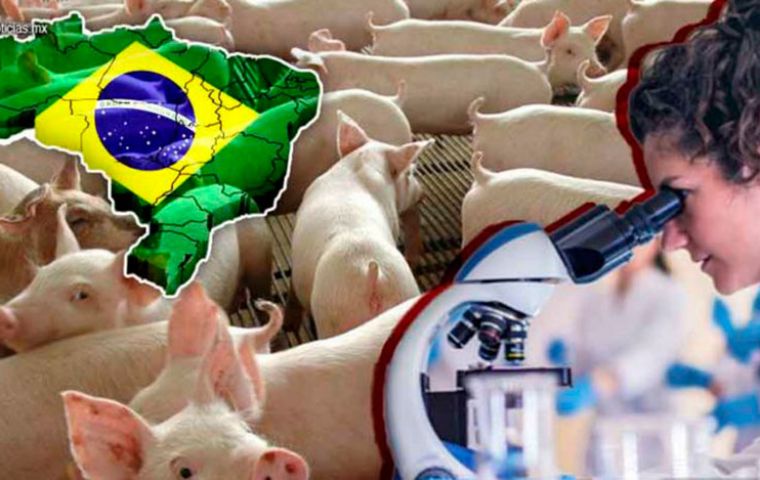MercoPress. South Atlantic News Agency
Highest alert in Brazil with African Swine Fever outbreak in Dominican Republic, which spread from 2 to 11 provinces
 Brazilian experts are in direct contact with animal health authorities in Dominican Republic, with regional organizations, and with OIE for the Americas
Brazilian experts are in direct contact with animal health authorities in Dominican Republic, with regional organizations, and with OIE for the Americas Brazil said that it is closely monitoring the outbreak of African Swine Fever, ASF, in the Dominican Republic and is taking the necessary measures, including an alert on the control of imports, international agriculture surveillance, and animal health services.
While Brazil which has a massive pig breeding an pork exporting industry tightens sanitary controls, from the Dominican Republic it was reported that more cases of ASF were found in another nine provinces, bringing the total to 11 of the 32 provinces.
According to the Brazilian Ministry of Agriculture, the arrival of ASF on the American continent “increases the state of alert with the intensification of measures to prevent the introduction of the disease in Brazil”. “We reinforced the recommendations for surveillance in ports and airports to ensure that airlines, maritime companies, and travelers abide by the bans on the entry of products that represent a risk of pests and diseases for agriculture,” said the Animal Health director of the Ministry of Agriculture, Geraldo Moraes, in a statement.
Brazilian government technicians are in direct contact with the animal health authorities of the Dominican Republic, with regional organizations, and with the representation of the World Organization for Animal Health (OIE) in the Americas, and have already offered help to control the spread of the disease in the region.
Among the eleven Dominican provinces are Sánchez Ramírez and Monte Cristi which were made public last week, but additionally this Tuesday infected locations were found in the provinces Santiago, Hermanas Mirabal, La Vega, Elías Piña, San Juan and the National District. Sanitary control brigades are working in the demarcations zones to intervene the backyard hatcheries.
In a press conference in Santo Domingo, Fernando Duran, administrator of the state-run Banco Agrícola announced the government will pay pig farmers the market price of each animal slaughtered.
Through Banco Agrícola, the authorities guarantee payment according to the current market price for pigs that are slaughtered in the demarcations so that farmers loses are mitigated. According to Banco Agricola staff pig farmers will be able to withdraw the compensation funds within 12-15 days. It is estimated losses could reach US$ 180 million.
Army personnel and brigades equipped with bio-security suits are handling the slaughter and burial of pigs in pits deep enough to try and contain the spread of the ASF. Brigades have also been instructed to confiscate swine raised privately for personal consumption.
Brazil in 2020 produced 4,4 million tons of pork, of which it exported, 1,02 million tons valued at US$ 2,27 billion. Per capita pork consumption among the Brazilian population of 210 million is 16 kilos.




Top Comments
Disclaimer & comment rulesCommenting for this story is now closed.
If you have a Facebook account, become a fan and comment on our Facebook Page!